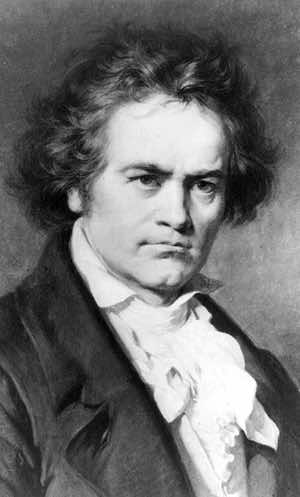Top > Musicians Related to C.P.E. Bach > Beethoven
This site introduces unknown composer Emanuel Bach (C. P. E. Bach). This English version was translated from Japanese one by ChatGPT.
Ludwig van Beethoven
ChatGPT4o writes as follows (please note that it may not be accurate):Ludwig van Beethoven (1770–1827) was a German composer who epitomized Classical music and paved the way for the Romantic era. He is renowned for his profound emotional expression and innovative musical structures, leaving a significant impact on the course of Western music.
Born in Bonn, Beethoven exhibited exceptional musical talent from an early age. In his late teens, he moved to Vienna, where he absorbed the influences of Haydn and Mozart while developing his own distinctive style. He was also an outstanding pianist, especially celebrated for his exceptional skill in improvisation.
Beethovenʼs works are typically divided into three periods: early, middle, and late. His early works were rooted in the traditions of Mozart and Haydn. During his middle period, he composed large-scale and groundbreaking works, such as the *“Eroica Symphony”* (Symphony No. 3). In his late period, despite his progressing deafness, he created deeply spiritual and philosophically profound compositions like the *Ninth Symphony* and *String Quartet No. 14*.
Beethoven produced masterpieces across various musical genres, including symphonies, sonatas, string quartets, and the opera *“Fidelio.”* His 32 piano sonatas and nine symphonies, in particular, are celebrated for their innovation and emotional depth, remaining highly significant to this day.

Beethovenʼs life was fraught with many challenges, with his hearing loss posing a profound psychological struggle. Nevertheless, he overcame these hardships and pursued themes of humanity and freedom through his music.
Beethovenʼs music is beloved worldwide for its power and universal message. His works are regarded as transcending the Classical tradition, expressing profound introspection and the pursuit of personal and artistic freedom.
Site search by Google
Upper< Lower> items
< Musicians Related to C.P.E. Bach> Beethovenʼs *Fidelio*
> Beethovenʼs Studies and Haydnʼs Instruction
> ChatGPTʼs Recommended Performances of Beethovenʼs Symphonies
> D. Scarlatti and Beethoven
> The Failed Premiere of Beethovenʼs Violin Concerto
> The Influence of C.P.E. Bach on Beethovenʼs Sonatas
> The Scherzo in Beethovenʼs Symphonies
> Use of Counterpoint in String Quartets
> Using Counterpoint in Later Years